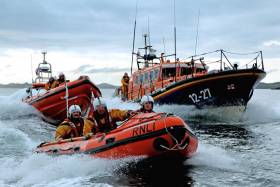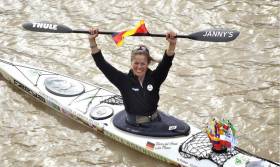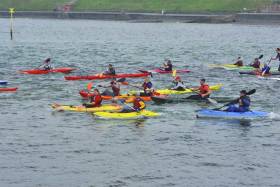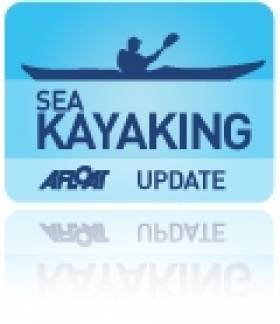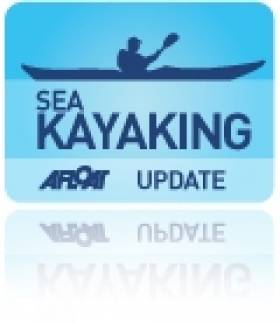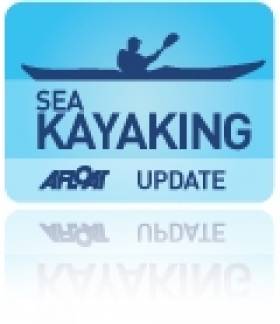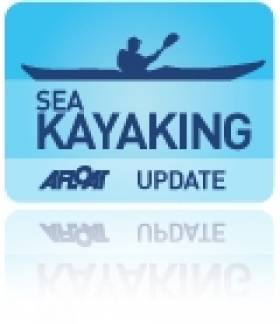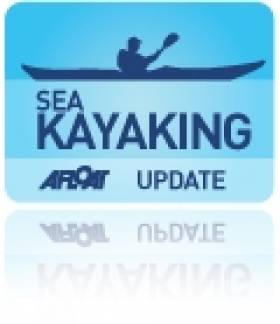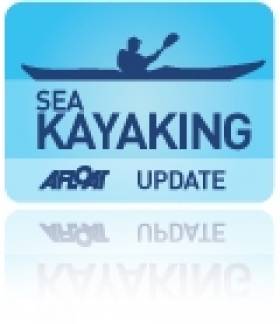Displaying items by tag: sea kayaking
Earlier this week, experienced sea kayaker Jon Hynes set out on a journey with a difference — paddling the entire Cork coastline solo in aid of a charity very close to his heart.
Three years ago Jon’s wife Alayne was diagnosed with breast cancer. She has since made a full recovery, thanks in no small part to the support services provided by Cork ARC Cancer Support House.
Jon says that he vowed from the day of Alayne’s diagnosis that he would use his sea kayaking skills to give back to those who helped his family through the most challenging of times.
 Jon Hynes with his wife Alayne, who was supported throughout her treatment for breast cancer by Cork ARC Cancer Support House | Credit: Jon Hynes
Jon Hynes with his wife Alayne, who was supported throughout her treatment for breast cancer by Cork ARC Cancer Support House | Credit: Jon Hynes
And now he’s doing just that, tackling all 935km of Cork’s jagged mainland coastline in a kayak he’s also rigged with a 1sqm sail “so when conditions favour I have the added challenge and fun of sail kayaking”.
Jon has already made incredible progress in the four-plus days since setting off on this adventure, claiming an “excellent run” via Roaringwater Bay and Baltimore — and putting in three massive 50km-plus days on the water.
But that’s not so surprising to anyone familiar with his 1,500 round-Ireland paddle in 2015, the subject of an award-nominated documentary as previously reported on Afloat.ie.
He aims to reach the end of the route in Youghal by lunchtime tomorrow (Monday 18 July) and any new contributions towards his €5,000 fundraising goal will surely give him the push he needs to get there.
“I am really excited to deliver this fundraiser,” Jon says, “the gratitude that I feel towards everyone across all the medical services in helping my wife survive breast cancer runs deep.
“In particular, though, I want to acknowledge by my kayaking paddle strokes just how much I appreciate ARC House, their fantastic team and their range of services.
“Cork is a beautiful place to live and thrive, but it is comforting to know that service like Cork ARC house is there when someone has a cancer battle on their hands. Thank you for supporting my fundraiser for Cork ARC.”
Keep up with the latest on Jon’s adventure on his Facebook page HERE.
Sea Kayakers Rescued By Clifden Lifeboat Crew
Two sea kayakers were rescued from the water off Ballyconneely in western Connemara by Clifden RNLI’s volunteer lifeboat crew yesterday afternoon (Tuesday 6 August).
Just after 4.30pm the lifeboat station’s volunteers responded to reports via the Irish Coast Guard of kayakers in distress from a member of the public on shore, who gave detailed information of their location.
According to Clifden RNLI, the lifeboat crew were told one kayaker had entered the water and got into difficulty when they were separated from the vessel, which had also flooded and capsized.
Clifden’s Atlantic 85 inshore lifeboat, helmed by Joe Acton, was first on the scene and found the two kayakers standing and waving from offshore rocks near the Connemara Golf Course.
The two women, with their the remaining kayak, were taken on board the lifeboat where they were quickly assessed and given blankets as they were returned to shore, where members of Cleggan Coastguard Unit took over their care.
Clifden’s inshore D class lifeboat was also on the scene having travelled by road and launched at a nearby beach. Helmed by Owen Hayes, this second lifeboat recovered the capsized kayak and also returned to shore.
The Mersey class all-weather lifeboat was stood down en route to the scene.
This was the third launch in a week by the Clifden lifeboat crew. The station’s operations manager John Brittain said: “The crew did very well today to get three boats on the water in a matter of minutes and thankfully we were on the scene very quickly.
“This is an example of how situations at sea can change rapidly, and the vigilance of the public is so important, especially at busy times of year and in holiday destinations.”
Round-Ireland Kayaker Has Sights Set On Biggest Goal Yet
#Kayaking - A German woman who circumnavigated Ireland by kayak in 2016 is taking the story of her remarkable global padding adventures on tour across Europe, as the Irish Examiner reports.
Freya Hoffmeister recently returned to Ireland to give talks in Dublin and Cork on her epic solo kayaking voyage around South America, which she undertook in sections over more than 30 months between 2011 and 2015.
Before that, she paddled around Iceland in what’s regarded as the ‘K2 of sea kayaking’, and took on New Zealand’s South Island that same year.
The speaker and endurance athlete also holds a circumnavigation of Australia among her host of achievements — with her next being the mammoth undertaking of North America, which will require kayaking through the treacherous Northwest Passage.
But as lofty as these goals might seem to the average human, Freya brings things down to earth in her motivational talks, on which the Irish Examiner has more HERE.
Rain Stays Away For Bangor Bay Sea Kayak Race
#SeaKayaking - Belfast Lough escaped the rain as the fifth Bangor Bay Sea Kayak Race was held in great conditions yesterday afternoon (Saturday 27 May).
Organised by Jackie Patton of Ballyholme Yacht Club and members of Belfast Kayak Club, and with all proceeds going to the RNLI, more than 70 kayakers and paddle boarders took to the water in a wide variety of craft, and were seen on their way by a volunteer crew from Bangor RNLI.
Before taking to the water, each kayak was checked by organisers to make sure it met the required safety standard, and that every competitor was suitably attired.
Delighted by the turnout, Jackie Patton said afterwards: “This event gets better every year, with more boats taking part, and the pre-race checks give us a perfect opportunity to reinforce key safety messages with the kayakers.”
RNLI community safety officer Peter E Bullick was also on hand to offer safety advice to competitors.
Following the event, the prizegiving was held in Ballyholme Yacht Club, and Bangor RNLI lifeboat operations manager Kevin Byers thanked everyone for their generosity and said it was events like this that provided vital funds to the RNLI.
Unfortunately, the start of the race was delayed by an unrelated accident on one of the yacht club’s slipways, as safety boats were being launched.
The Bangor RNLI crew were among the first to attend, and were able to put their first aid training into practice by helping to lift the casualty into the ambulance.
Helmsman Gareth Whan said: “There are always danger points when launching boats, and this accident highlights the fact that accidents happen off the water as well as on.
“The crew and I were delighted to be able to offer some assistance to the casualty, and we wish him well for a full recovery.”
#Kayaking - Manx kayakers Keirron Tastagh and George Shaw have been forced to abandon their attempt at setting a new round-Ireland sea kayaking record.
As IOM Today reports, strong headwinds slowed their clockwise progress around the coast from Strangford Lough, and they called it a day upon reaching Baltimore in West Cork after 12 days at sea last Thursday 4 June.
Despite their record-setting experience in sea kayaking, the duo were forced to endure energy-sapping gusts of up to Force 7 amid squalls and hailstorms over a tumultuous fortnight that saw a hoped-for high pressure system fail to arrive.
Tastagh and Shaw had been hoping to cover as many as 50 nautical miles a day in their seagoing kayaks to break the current record of 28 days and raise funds for the RNLI.
IOM Today has more on the story HERE.
#Kayaking - Red Bull recently caught up with sea kayaking adventurer Justine Curgenven, who is currently over a month and more than half way into her 1,000-mile circumnavigation of Ireland.
Unlike Elaine 'Shooter' Alexander's epic solo voyage two years ago, the New Zealander has some extra paddle power in the form of her partner Barry Shaw and friend Roger Chandler.
"We aren't going for any speed records, just hoping to enjoy the scenery and meet some local people," she says of their 50-day adventure around Ireland.
But that's not to say our waters aren't challenge for this experienced kayaker.
"Irish waters can be very challenging," says Curgenven. "They get 2-3m swells quite regularly and are known for their surf beaches, which we are trying to avoid!"
Despite the hard work, the film-maker says "time really does fly when you're having fun... If you like circumnavigations then it's really a great island to paddle around."
Red Bull has more on the story HERE.
Inishowen Sea Kayak Symposium This Weekend
#SeaKayaking - The East Inishowen Sea Kayak Symposium takes place this weekend from 26-28 April.
Hosted by Just Kayak at the shorefront in Moville, Co Donegal, the weekend costs €130 for all coaching and guides, plus two nights self-catering bed and breakfast plus lunches and an evening meal.
Friday evening will feature a talk from Elaine 'Shooter' Alexander, discussing her epic circumnavigation of Ireland by sea kayak two years ago that we followed here on Afloat.ie.
Saturday will be a full day of coaching and guided trips around the Inishowen peninsula, followed by an evening of talks from guest coaches.
The final day on Sunday features a choice of different coaching sessions - and for something a little different, chef Brian McDermott will give a demonstration of outdoor cooking which might prove handy on your next kayaking trip.
For more details and booking info visit the Just Kayak website.
In other sea kayaking news, a Plymouth couple are hoping to be the first husband-and-wife team to kayak around the British and Irish coasts.
As The Herald in Plymouth reports, Andy and Jane Morton from Bere Alston left Plymouth aboard their double kayak Persey earlier this month beginning their five-month challenge for the RNLI and a local MS charity.
You can follow the couple's progress via their website HERE.
Top NI Surf Kayaker Set To Cross Irish Sea
#SeaKayaking - A Portrush teen is preparing to cross the Irish Sea by kayak for charity this summer.
Top surf kayaker Andy McClelland aims to raise funds for the Alzheimer's Society, Kidney Research and the Regional Respiratory Centre with his One Man One Boat campaign, which will see him kayak 22 miles across the open water from Donaghadee in Co Down to Portpatrick in Scotland.
The current Surf Kayak Junior World Champion will embark on his challenge in a high-performance sea kayak on loan from Rockpool Sea Kayaks and is presently planning his trip with fellow physiotherapy students at Ulster University Jordanstown as well as the Causeway Coast Kayaking Club.
McClelland has yet to set a date for the solo crossing, awaiting word on the best possible weather and sea conditions in May.
The Alzheimer's Society has more on the story HERE.
Night Sea Kayaking Trips on Kinvara Bay This Winter
#SEA KAYAKING - Outdoors Ireland are running night-time sea kayaking trips on Kinvara Bay on Friday evenings over this winter and spring.
Beginning at 6pm each Friday, you can savour the sights, lights and sounds of Kinvara right on the water as you paddle by sea kayak through this southeastern corner of Galway Bay.
Paddle among deserted islands, listening to the abundant wildlife and possibly catching a glimpse of the gleaming eyes of friendly seals!
Moreover, witness the sight of the sparkling lights of Kinvara Town and the quietly impressive 16th-century Dungaire Castle.
With new sea kayaks, warm equipment provided and a local experienced guide, all abilities are catered for. This is an experience not to be missed next time you are in Galway.
The price is €50 per person for a three-hour kayak trip. For more details or photos please contact [email protected] or 086 860 4563.
Hop in a Kayak to See Galway By Sea
#SEA KAYAKING - One of the best ways to see the sights of Galway is by sea, as Belfast writer Mark McCormick found out recently.
Writing in the Belfast Telegraph, he describes the "spectacularly beautiful scenery" and "medley of contrasts" he and his wife were treated to on a two-day guided sea kayaking tour of the region surrounding the City of the Tribes.
Being kayaking novices was no barrier to the couple as they paddled in a calm Kinvara Bay at sunset with a guide from Outdoors Ireland, joined by some playful seal pups, before drifting on to the preserved 16th-century Dunguaire Castle - one of the west's most popular tourism spots.
More urban sights were in store the next day as they joined a bigger group for a tour of the city's docks and the Claddagh, including the area's famous swans.
Outdoors Ireland has much more from the Telegraph story HERE.


























